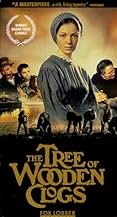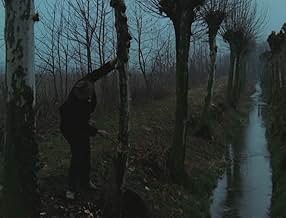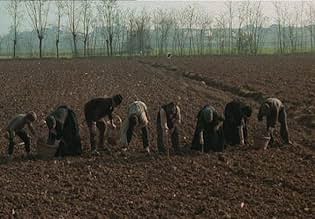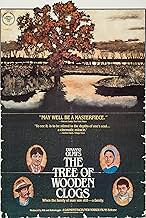Peasant life in a feudal farm in rural Italy at the end of the 19th century.Peasant life in a feudal farm in rural Italy at the end of the 19th century.Peasant life in a feudal farm in rural Italy at the end of the 19th century.
- Won 1 BAFTA Award
- 18 wins & 1 nomination total
- Director
- Writer
- All cast & crew
- Production, box office & more at IMDbPro
Featured reviews
The film will be with me for a long time.
The film slowly unveils to the viewers one year in the life of Italian peasants at the close of the nineteenth century. That's about it. There's no hero, no antagonist, and no great wrong that gets set right; it's simply a slice of life. I do not want to reveal too much of the story because I think it will spoil it for the viewer.
The film can serve as an educational tool for viewers with children. It's like going to an outdoor historical museum, only the viewer gets to see everything that it would take one whole year to see at the museum (without the crowds). For example, the director takes the time to show painstakingly what it was like to wash clothes one hundred years ago. It's essentially a living documentary of late nineteenth century Italian provincial life.
Most American audiences will have to get used to the slow pace of the film. Even the humor is extremely subtle. Surprisingly, I enjoyed the pace. The pace was silent, peaceful, and steadfast just as the families are in the film. To me it is an escape (ironically an escape from an escape) from many of today's films that just explode with sound effects and rock music; films that move at blurring speed with scene cuts that are made with the intent to maximize audience stimulation but often with the result of increasing our stress level. This movie is a restful reprieve.
One of the Greats
I can think of several films that have had that effect on me. Eric Rohmer's "Summer (Le Rayon Vert)" and Kieslowski's "Decalogue" spring to mind. But "Tree of Wooden Clogs" approached the core. I'm not Catholic, would pronounce myself an atheist if that didn't suggest the arrogance of certainty, but this movie comes as close to touching the soul as any I've ever seen. It is one of the most shattering, delightful, and profound works of art ever created. After first seeing it, I sat in my car, clutched the steering wheel, and sobbed for half an hour.
Since that day, many years ago, moments from it continue to haunt me. I'll be walking down a street lined with trees and remember the boy walking home from school. Out of the blue, the looks on the faces of the just-married young couple as they adopt a child will come to me. And, of course, the image of the villagers watching the lone wagon disappear into the darkness is one which will live with me until I die.
In short, as I stumble my own way through life, this film is one of the touchstones that reminds me why I'm here.
Speaks to the soul in a voice of simple beauty that declares that money is not the ultimate key to survival.
A sublime hypnotic narrative.
Don't be afraid of this film. It does not actually seem long, nor does it seem aimless or plotless. While one may say that "the whole pesant community" is the real protagonist there are clearly defined characters in the film whose narratives we follow. In fact, the films strategy is one of integration of these narrative strands in a seemingly coherent and logical way. A wonderful, very emotionally moving experience with a clear, sharp, political analysis.
Sacramental epic.
The most authentic version on this film has the original Bergamasco dialect track. The newer DVDs from Italy have the option of choosing this soundtrack.
Did you know
- TriviaAll the actors were real peasants from the Bergamo province, in Italy. They had no acting experience at all.
- GoofsWhen the children are making music with pots and pans, the 'instruments' of the little girl are switching from one hand to the other when the camera looks at her from the other side.
- Quotes
[first lines]
Don Carlo: That boy should be going to school.
Batistì: Yes but six kilometers to school and six kilometers back seems a lot.
Don Carlo: He's young, he has strong legs.
Batistì: Just when we're about to have another baby. He could have started helping me around the house.
Don Carlo: He'll help you even more when he's older. Let providence provide for now.
Batistì: I grew up without ever seeing the inside of a school.
Don Carlo: That's not a good reason, and you know it. If God has given your boy a good mind, it's a sign he's expecting more of him. As the boy's father, it's your duty to do God's bidding.
- Crazy creditsQuite strangely, the names of the actors are listed as "last name first name", while the names of the rest of the crew are correctly listed as "first name last name".
- Alternate versionsThere are two versions of this movie: one which is spoken in the dialect of Bergamo, Italy, and one in which the actors dubbed themselves in Italian.
- ConnectionsEdited into Bellissimo: Immagini del cinema italiano (1985)
- SoundtracksIch steh' mit einem Fuß im Grabe BWV, 156
Composed by Johann Sebastian Bach
Performed by Fernando Germani
- How long is The Tree of Wooden Clogs?Powered by Alexa
Details
Box office
- Gross worldwide
- $9,367
- Runtime
- 3h 6m(186 min)
- Sound mix
- Aspect ratio
- 1.33 : 1






















